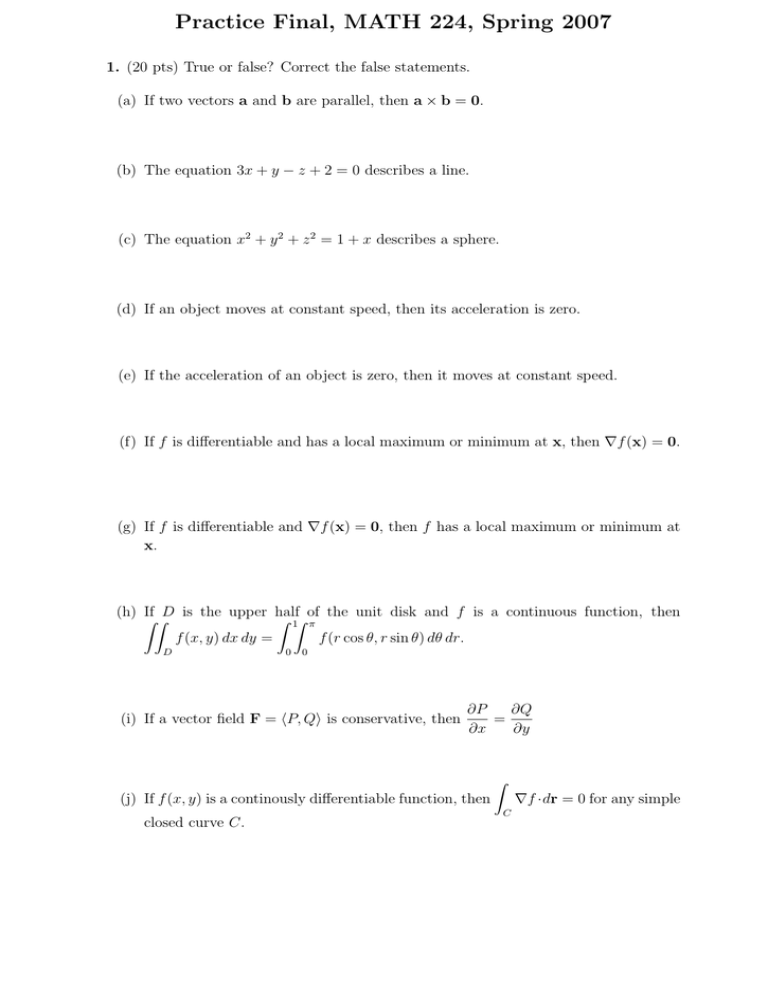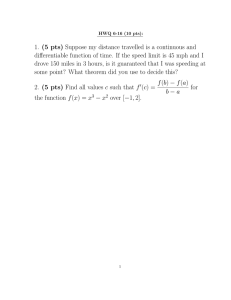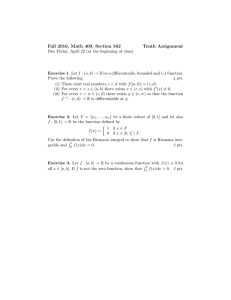Practice Final, MATH 224, Spring 2007
advertisement

Practice Final, MATH 224, Spring 2007 1. (20 pts) True or false? Correct the false statements. (a) If two vectors a and b are parallel, then a × b = 0. (b) The equation 3x + y − z + 2 = 0 describes a line. (c) The equation x2 + y 2 + z 2 = 1 + x describes a sphere. (d) If an object moves at constant speed, then its acceleration is zero. (e) If the acceleration of an object is zero, then it moves at constant speed. (f) If f is differentiable and has a local maximum or minimum at x, then ∇f (x) = 0. (g) If f is differentiable and ∇f (x) = 0, then f has a local maximum or minimum at x. (h) If the unit disk and f is a continuous function, then Z ZD is the upper half Z 1Z of π f (x, y) dx dy = f (r cos θ, r sin θ) dθ dr. D 0 0 (i) If a vector field F = hP, Qi is conservative, then ∂Q ∂P = ∂x ∂y Z ∇f ·dr = 0 for any simple (j) If f (x, y) is a continously differentiable function, then closed curve C. C 2. (8 pts) A constant force F = h1, 2, −3i moves an object along a line segment from (2, 0, 1) to (1, 3, 2). Find the work done if the distance is measured in meters and the force in Newtons. 3. (8 pts) A plane contains the points (2, 1, 0), (−1, 1, 1), and (0, 0, 2). Find a vector which is perpendicular to the plane. Where does the plane intersect the x-axis? 4. (8 pts) Identify and sketch the surface x = y 2 + z 2 − 4z. 5. (8 pts) Find the linearization of f (x, y) = to estimate f (1.1, 1.9). p x2 + 2y 2 at the point (1, 2) and use it 6. (8 pts) Let f (x, y, z) = xy + z 2 . Find the directional derivative of f at the point (3, 0, −2) in the direction of v = h−1, 2, 2i. What are the directions of maximal and minimal directional derivatives at (3, 0, −2)? 7. (10 pts) Let f (x, y) = x2 y + y 3 − y. Find all critical points of f and determine whether they are maxima, minima, or saddle points. Z 4Z 8. (10 pts) Evaluate 0 2 √ 3 ey dy dx by reversing the order of integration. x 9. (10 pts) Consider a lamina that occupies the region 4 ≤ x2 + y 2 ≤ 9, with mass density ρ(x, y) = (x2 + y 2 )−3/2 . Find the moments of inertia of the lamina about the coordinate axes. Z 10. (10 pts) Use Green’s Theorem to evaluate C √ (y + sin x)dx + (3x − ln(1 + y 2 ))dy, where C is the circle (x−3)2 +(y −1)2 = 4, parameterized in counterclockwise direction. (Hint: You may use the fact that the area of a circle of radius r is πr2 .)




